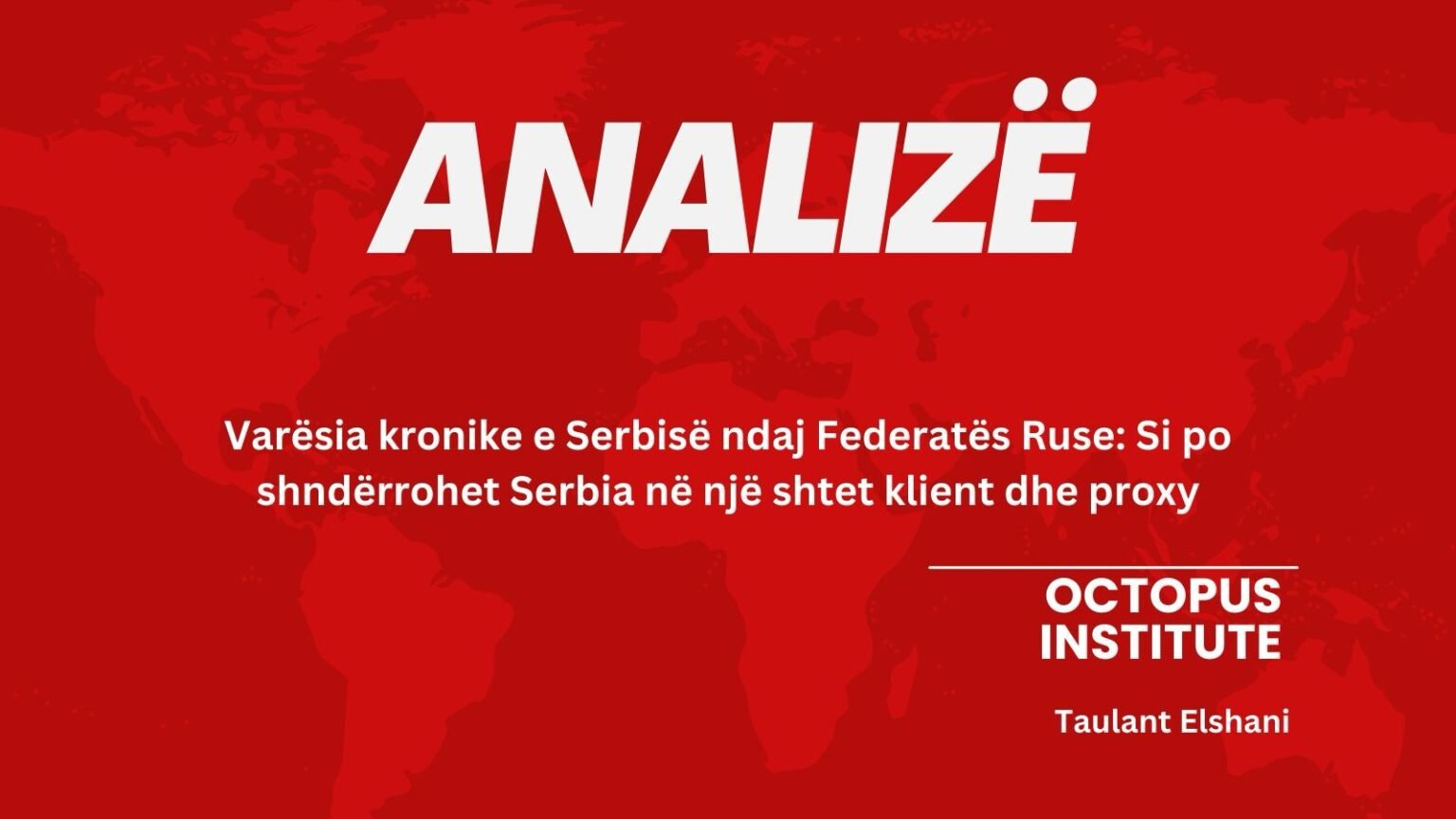Serbia’s chronic dependence on the Russian Federation: How Serbia is turning into a client and proxy stat
Dependence in the inter-state and political context involves a wide and often intertwined spectrum of factors. As a multifaceted concept, dependency can be defined as the degree to which one state or political entity relies on another for political support or diplomatic cooperation. In the historical events in the Balkans, and especially from 1878 onwards, the special relations between Russia and Serbia have been decisive in the political fate of the latter, and have substantially shaped and influenced almost all the main political events in Serbia.
Relations between Russia and Serbia are strongly based on Slavic heritage; Russian and Serbian belong to the East and South Slavic branches of the Indo-European languages respectively. The Orthodox religion is another factor that cements the deep cultural ties between the two countries. The landscape of cultural affinities is strengthened by similarities in folklore, music, shared customs and mythology.
On the political level, Russia decisively sponsored the independence of Serbia in the Treaty of San Stefano (1878), which followed the Russo-Turkish war. Russia also helped Serbia during the Balkan wars, as well as in the First World War. In the wars of the 90s, the Russian Federation supported Serbia, while the latter caused one of the biggest tragedies in Europe since 1945.
The radical change of global geopolitical dynamics, and the redefinition of the strategic interests of the Russian Federation has deeply affected the nature of relations between these two countries. The relations between the Russian Federation and Serbia have now entered a new phase, characterized by the chronic dependence that Serbia has on the Russian Federation; transforming Serbia into a country partly as a client state and partly as a proxy. The Russian Federation, on the other hand, plays the role of the patron state, exerting a wide influence on the political and social life of Serbia.
A client state is generally understood when a country has significant political, military (security) and economic dependence on another country, usually to a more powerful one. This means limited sovereignty, and a constant need for military support. A proxy state is a country that is used by others to indirectly fight the conflicts of others. The concrete example in the Balkans is Aleksandar Vučić’s Serbia that can open Russia’s second front in Europe, causing aggression, conflicts and wars. The patron state is the powerful state that, for its strategic interests, controls proxy and client states.
Serbia has developed a heavy dependence on Russian energy, sophisticated modern weapons systems, ongoing diplomatic support and security. About 90% of natural gas in Serbia comes from Russia through the TurkStream pipeline; this translates into about 3 billion cubic meters of annual volume. 51% of Serbian gas and oil company NIS is owned by Russian giant Gazprom Neft, giving Russia substantial control over Serbia’s energy sector. Although there are efforts to diversify supply, dependence on Russia remains extremely high.
A large part of the modern weaponry currently in use by the Serbian Armed Forces comes from Russia. Modern weapons systems include Mig-29 fighter jets, Mi-8/17 transport helicopters, tanks and other armored vehicles, s-300 and Pantsir-S1 air defense systems. Military support continues with electronic warfare systems as well as lighter weaponry.
Russia offers Serbia strong diplomatic support in the obstructions against Kosovo. Russia protects the Serbian interest in world politics, blocking Kosovo’s membership in the UN, helps Serbia in the hybrid war campaign and operations, etc.
The cycle of chronic dependence that Serbia has developed towards Russia is completed by the Serbian model of autocracy applied by the current president Aleksandar Vučić. Vucic’s legitimacy stems to a considerable extent from his patron in Moscow, Vladimir Putin. Electoral machinations, control of the media, accumulation of power and recently the public articulation of the idea of the Serbian World are a copy of the Kremlin’s strategy for internal political control and regional dominance.
As we have seen, Russia exercises extensive control over Serbian politics and society, using it as a client and proxy state. Through this control, Russia pursues its strategic objectives, keeps Serbia away from the West and even uses it against the West, while supporting the regime of Aleksandar Vučić and sponsoring Serbia’s regional ambitions for the Serbian World project. As an immediate strategic objective, Russia could use Serbia to open a second front in Europe, thus supporting Serbia in a possible war against Kosovo and Bosnia-Herzegovina.
The vicious circle of the Serbian leadership, and the chronic dependence that Serbia currently has on Russia, the West cannot and should not manage by supporting and appeasing the regime of Aleksandar Vučić. This only maintains the current system of relationships and prolongs the agony in the Balkans. The West must sponsor the true democratization of Serbia, as the only way to normalize the situation in the Balkans.

